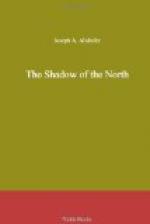Colden and his troop arrived soon, and the two little commands were united, to the great joy of all. Lieutenant Wilton had passed from the extreme of confidence to the utmost distrust. Where it had not been possible for an Indian to exist he now saw a scalplock in every bush.
“On my honor,” he said to Colden, “James, I was never before in my life so happy to see you. I’m glad you have the entire command now. As Mr. Lennox said, Providence saved me so far, but perhaps it wouldn’t lend a helping hand any longer.”
The pack horses carried surgical supplies for the wounded, and Willet and Black Rifle were skillful in using them. All of the hurt, they were sure would be well again within a week, and there was little to mar the general feeling of high spirits that prevailed in the camp. Wilton and Carson were lads of mettle, full of talk of Philadelphia, then the greatest city in the British Colonies, and related to most of its leading families, as was Colden too, his family being a branch of the New York family of that name. Robert was at home with them at once, and they were eager to hear from him about Quebec and the latest fashions of the French, already the arbiters of fashion, and recognized as such, despite the war between them, by English and Americans.
“I had hoped to go to Quebec myself,” said Wilton reflectively, “but I suppose it’s a visit that’s delayed for a long time now.”
“How does it happen that you, a Quaker, are second in command here?” asked Robert.
“It must be the belligerency repressed through three or four generations and breaking out at last in me,” replied Wilton, his eyes twinkling. “I suppose there’s just so much fighting in every family, and if three or four generations in succession are peaceful the next that follows is likely to be full of warlike fury. So, as soon as the war began I started for it. It’s not inherent in me. As I said, it’s the confined ardor of generations bursting forth suddenly in my person. I’m not an active agent. I’m merely an instrument.”
“It was the same warlike fury that caused you to come here, build your fire and set no watch, expecting the woods to be as peaceful as Philadelphia?” said Colden.
Wilton colored.
“I didn’t dream the French and Indians were so near,” he replied apologetically.
“If comparisons are valuable you needn’t feel any mortification about it, Will,” said Colden. “I was just about as careless myself, and all of us would have lost our scalps, if Willet, Lennox and Tayoga hadn’t come along.”
Wilton was consoled. But both he and Colden after the severe lesson the latter had received were now all for vigilance. Many sentinels had been posted, and since Colden was glad to follow the advice of Willet and Tayoga they were put in the best places. They let the fire die early, as the weather had now become very warm, and all of them, save the watch soon slept. The night brought little coolness with it, and the wind that blew was warm and drying. Under its touch the leaves began to crinkle up at the edge and turn brown, the grass showed signs of withering and Willet, who had taken charge of the guard that night, noticed that summer was passing into the brown leaf. It caused him a pang of disappointment.




